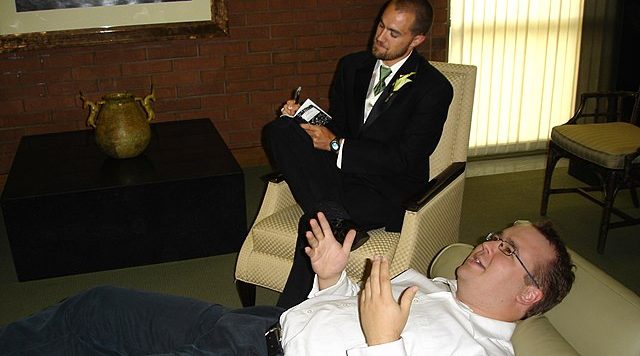Betterhelp yourself: the lacklustre world of online therapy
Despite a spiking demand for therapy, with reports of Brits suffering from mental health problems skyrocketing by 20 per cent from 1993 to 2014, England finds itself with an overwhelmingly cold therapy climate. With the NHS taking up to 18 weeks after referral for one talking therapy session and private counsellors charging between £50-£80 per hour, the current prospects for therapy are daunting — both emotionally and financially. Emerging in 2013, US company Betterhelp introduced itself as the modern solution to these problems: a cheaper, online alternative that could match clients with a licensed therapist in as little as 48 hours. 10 years later, Betterhelp has metamorphosised from a saving grace for the vulnerable into a laughing stock at the epicentre of harsh criticism for online therapy. In the present day, looking into what remains the biggest mental health company in the world, we have to posit a concerningly dystopian question: should one have to turn to the morally bankrupt for accessible therapy?
Emerging in 2013, US company Betterhelp introduced itself as the modern solution to these problems: a cheaper, online alternative
Betterhelp undeniably skews its marketing towards Gen Z and Millennial demographics, using internet icons of the digital age to promote its service to younger audiences. These include intensely popular YouTubers Anthony Padilla, Good Mythical Morning, and Phillip DeFranco, all of whom provide affiliate links for their viewers to access the service. In 2018, however, a reckoning in this YouTube sphere occurred as DeFranco announced that he was immediately ceasing his Betterhelp sponsorship. He cast a scrutinising light towards claims that some of the therapists on the service were not trained or certified, with Betterhelp’s own 2016 terms of service reading: “We do not represent to verify […] the skills, degrees, qualifications, licensure, certification, credentials, competence or background of any Counsellor”. With the company positing it is a client’s responsibility to “conduct independent verification regarding any Counsellor”, sinister doubts about the legitimacy of the service and safety of its clients spread across the internet like wildfire.
Betterhelp was swift to update their terms of service, asserting that full licencing documents are required from each therapist, but the flames at the feet of the company had been stoked. The backlash would worsen when, in 2020, Betterhelp was forced by the FTC to pay $7.8 million to settle charges that it had released the sensitive information of thousands of its users. Such information ranged from customers’ email and IP addresses to highly personal details, such as religious beliefs, sexual orientation, and whether clients had a history of depression, suicidal thoughts, or were on medication.
After only 7 years of being in business, Betterhelp had exploded in infamy, crafting a reputation as an untrustworthy company that systematically took advantage of its users for profit
After only 7 years of being in business, Betterhelp had exploded in infamy, crafting a reputation as an untrustworthy company that systematically took advantage of its users for profit. Why then, does Betterhelp currently have over 374,000 active users in the United States alone, and why are Brits still so reliant on the service?
For a monthly subscription, Betterhelp offers four live sessions, each lasting 30 minutes, as well as the ability to share journal entries and messages with your assigned therapist at any time. Their app also offers ‘groupinars’: webinars discussing important mental health topics including anxiety and ADHD. Whilst these services sound productive at a base level, upon closer inspection several pivotal cracks materialise within each of these offerings.
Frankly, a tightly capped 30-minute session is unspeakably restrictive for therapy, particularly in the early meetings when a therapist imperatively seeks to understand the aims and personality of new clients. Traditional therapy sessions in the UK commonly last anywhere between 50 minutes to an hour, with this increased timeframe allowing for a more personalised experience and strengthening the patient-therapist bond intrinsic to successful counselling. In addition to this, whilst the ability to message your therapist at all hours may sound enticing, psychologist Carly Dober argues that it poses ethical concerns, with therapists required to respond to messages within 24 hours and 48 hours on weekends. This disavowing of boundaries breeds codependent patient-therapist relationships that are destructive for both parties, minimising the potential impact of any attended sessions.
Indeed, even the shining point of redemption for Betterhelp – its claims of affordability – are not strictly true. The company does not accept any form of medical insurance and was discovered to partake in surge pricing, charging clients more if they lived in urbanised areas. This could bring the cost of Betterhelp therapy up to £80 a week, leaving clients paying the same as traditional therapy whilst receiving half the session time.
However, when faced with the alternative of waiting several weeks for NHS treatment or seemingly more expensive counselling, struggling Brits see Betterhelp as the best pathway out of a bleak selection
In light of this infamy, it seems ridiculous that the service should still be so popular. However, when faced with the alternative of waiting several weeks for NHS treatment or seemingly more expensive counselling, struggling Brits see Betterhelp as the best pathway out of a bleak selection. Disappointingly, the only way to solve the Betterhelp problem is to improve the accessibility of therapy as an institution across the UK, with wait times and costs acting as crude barriers to mental health help that can be essential. In lieu of these improvements, Betterhelp has proven that it will continue to thrive, using targeted advertising to promote lacklustre services to those seeking genuine, affordable therapy, and aggressively marketing until their scandals are all but lost to Brit consciousness.

Comments